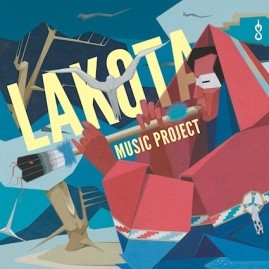Lakota Music Project releases self-titled first recording
 SIOUX FALLS— On October 28, the Lakota Music Project, a collaboration between South Dakota Symphony Orchestra (SDSO) and musicians from the Oglala Sioux and Sisseton Wahpeton Oyate Tribes will release its first recording, the self-titled Lakota Music Project on innova Recordings. Years in the making, this groundbreaking collaboration melds two musical worlds: Native American music including intergenerational traditional songs and ceremonial works, and the tradition of American compositions born out of the European classical canon.
SIOUX FALLS— On October 28, the Lakota Music Project, a collaboration between South Dakota Symphony Orchestra (SDSO) and musicians from the Oglala Sioux and Sisseton Wahpeton Oyate Tribes will release its first recording, the self-titled Lakota Music Project on innova Recordings. Years in the making, this groundbreaking collaboration melds two musical worlds: Native American music including intergenerational traditional songs and ceremonial works, and the tradition of American compositions born out of the European classical canon.
Recorded on October 20–25, 2021 in the Mary W. Sommervold Concert Hall of the Washington Pavilion, Lakota Music Project includes four commissioned works that create Lakota Music Project’s core repertoire–Black Hills Olowan (Brent Michael Davids), Wind on Clear Lake (Jeffrey Paul II), Waktégli Olówaŋ (Victory Songs) for Solo Baritone and Orchestra (Jerod Impichchaachaaha’ Tate), and Desert Wind (Jeffrey Paul II)–and one new arrangement of the traditional hymn Amazing Grace (Theodore Wiprud).
Addressing ongoing racial tension in South Dakota and histories of oppression and erasure against Native Americans across the United States, the Lakota Music Project strives for reconciliation and imagines a new future for all people, one that is egalitarian, open, and authentic.
Upon accepting his position at SDSO in 2004, Music Director Delta David Gier recalls, “I came to South Dakota with a conviction that an orchestra should serve its unique community uniquely.” For Gier, this meant meeting with tribal elders and community members, hearing about the history of his new home, and learning about the communities, traditions, and tensions between Native Americans and whites within South Dakota. “Early on, we learned this lesson that we needed to give up control of how we’ve always done things, and that is how we slowly built the impactful programming that has led us to where we are today.”
First created between 2005 and 2008 through a collaboration between the South Dakota Symphony Orchestra and leaders of the Lakota community, the first Lakota Music Project concerts in 2009 included the SDSO and the New Porcupine Singers (a renowned Lakota drumming group) performing songs from each culture based on archetypal themes of love, war, grief and celebration in six of South Dakota’s nine reservations. This inaugural concert tour was successful, according to Gier, “because of all the relationships that we had already established across the state. This wasn’t just an outreach program, but true engagement developed over time through intercultural cooperation and sharing our stories and songs with each other.”
Emmanuel Black Bear is the Keeper of the Drum for the Creekside Singers, featured in this recording. About the Lakota Music Project, Black Bear says, “Every culture has music. If we can fuse our music together, we can be human together. I’ve been doing the Lakota Music Project for all of these years because I want to lessen racism and prejudice for my children and grandchildren.”
During the last decade, the Lakota Music Project has evolved and grown, adding Dakota cedar flute, solo Lakota singers and hand drums in concert with SDSO’s full and chamber orchestra, string quartet, and wind quintet, performing throughout the state to bring the music directly to audiences. In 2017, Jerod Tate, composer-in-residence at the time, created the Music Composition Academies which are designed primarily for Native American students, who during a weeklong, tuition-free summer camp compose their own pieces for either a wind quintet or string quartet. In September, when school starts, SDSO musicians perform the student compositions at their schools. Theodore Wiprud has nurtured the Music Composition Academies since 2018.
Over 10,000 people have experienced a total of 27 Lakota Music Project performances in 12 towns and 6 reservations across South Dakota from 2009-2021. In 2019, SDSO musicians and the Lakota Music Project performed outside of South Dakota for the first time for a series of concerts in Washington, D.C. as South Dakota cultural ambassadors.
Gier explains one important locale where the Lakota Music Project had not previously performed: “But, we never performed Lakota Music Project on our mainstage until last October. This was always designed to be free to the public, performing on Indian reservations and community centers, creating maximum access for everybody. No barriers meant no concert halls.”
In celebration of SDSO’s centennial season, all of the music featured on this recording was featured for the first time in one Lakota Music Project concert on the mainstage at the Washington Pavilion at Sioux Falls on October 23, 2021. Featuring the Creekside Singers and Dakota cedar flute player Bryan Akipa, this was the first time many of SDSO’s dedicated subscribers had the opportunity to hear this collaboration.
The Lakota Music Project recording celebrates sixteen years of bridging cultures, fostering friendships and community, listening and learning, exchanging ideas, and creating new musical works together.
Gier shares:
“What I always hear from our Lakota musicians about why they play is they hope to pass their stories and culture onto the next generation. And that’s exactly what we do, too, as classical musicians. We play 500 years worth of music. We are all stewards of this artform; we hope to pass it onto the next generation better than we found it. So that was a real connection point for us, musically. This is where this all began and this is where we continue to go.”
The post Lakota Music Project releases self-titled first recording first appeared on Native Sun News Today.
